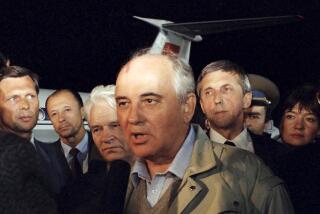Aliyev Dropped From Soviet Politburo : Ex-KGB Official From Azerbaijan Apparently Was Forced to Retire
- Share via
MOSCOW — Geidar A. Aliyev, a former KGB officer who had been at the pinnacle of Soviet power for more than a decade, was dropped Wednesday as a member of the ruling Politburo.
The official news agency Tass said that Aliyev, 64, asked to be relieved of his Politburo duties “in connection with retirement on health grounds.” The Communist Party Central Committee accepted his resignation at a surprise meeting in the Kremlin.
No replacement was named.
Aliyev also was expected to give up his post as a first deputy premier, one of three people now holding that rank under Premier Nikolai I. Ryzhkov.
Although Aliyev was not seen in public for several months earlier this year and was reported to have been ill, the lack of praise for his past services was one hint that he had been forced to quit.
His departure should give Soviet leader Mikhail S. Gorbachev a more certain majority on the Politburo since eight of its 13 senior members have been elevated to the ruling body since he was promoted to the top job in March, 1985. Gorbachev also presided over the selection of four of its six candidate, or non-voting, members.
While Aliyev was not regarded as an opponent of Gorbachev, he did not appear to have close personal ties with the leader, either.
A native of Azerbaijan, Aliyev was named a candidate member of the Politburo in 1976 when the late Leonid I. Brezhnev was leader. It wasn’t until six years later, when the late Yuri V. Andropov was in charge at the Kremlin, that Aliyev became a full member of the elite group.
During the 27th Communist Party Congress early in 1986, when Gorbachev was attacking Brezhnev and his allies for their extravagant, elitist ways, Aliyev called a press conference--a rare event for a Politburo member--and defended the practice of having special shops for party bigwigs.
“I live well . . . better than most,” Aliyev said at the time, comparing his monthly salary to that of a factory director. “We have to fight the negative effects of owning more things and set an example.”
At the press conference, he was asked why he had mentioned Brezhnev’s name 13 times in a 15-minute speech at the preceding party congress. Blushing, he laughed and replied: “There’s nothing unusual in this--he was general secretary (of the party) and many comrades mentioned his name.”
He ranked fourth in length of Politburo service behind Gorbachev, Soviet President Andrei A. Gromyko and Ukrainian leader Vladimir V. Shcherbitsky.
There has been speculation for years that Gorbachev was trying to oust the 69-year-old Shcherbitsky, once a close ally of Brezhnev, but had apparently decided that it would be politically unwise to take on the well-entrenched Ukrainian.
Aliyev, who was the only representative of a traditionally Muslim republic on the Politburo, began his secret police career as an 18-year-old agent in the NKVD, the security organization that preceded the KGB, during World War II.
Working his way up the ranks, he became head of the KGB in Azerbaijan from 1967-69, holding the rank of major general. Moving into party work, he built a reputation for advocating firm discipline at the workplace and as a foe of corruption in the free-wheeling republic.
Because of his record in Baku, the republic’s capital, he attracted the attention of Andropov, who also mounted an anti-corruption campaign after moving from KGB chief to the Kremlin leadership.
2 Troublesome Areas
Under Gorbachev, Aliyev was responsible for transport and social services, two traditionally troublesome areas of the Soviet economy that some say have failed to meet Kremlin demands for increased efficiency.
The Central Committee, where Brezhnev’s former allies form a core of resistance to Gorbachev’s proposals for “radical reform,” met for the third time this year. It usually assembles in advance of the sessions of the Supreme Soviet, or Parliament, but this time it convened a day later.
Tass said the committee heard a report from Gorbachev on issues linked to next month’s 70th anniversary celebration of the Bolshevik Revolution. It also said he spoke on some “current tasks” facing the country but gave no details. His speech was not made public immediately.
Gorbachev is scheduled to make a major address Nov. 2, five days in advance of the actual anniversary on Nov. 7. Western analysts said he may have offered a preview of the main themes of his address to Wednesday’s Central Committee plenum.
More to Read
Sign up for Essential California
The most important California stories and recommendations in your inbox every morning.
You may occasionally receive promotional content from the Los Angeles Times.













